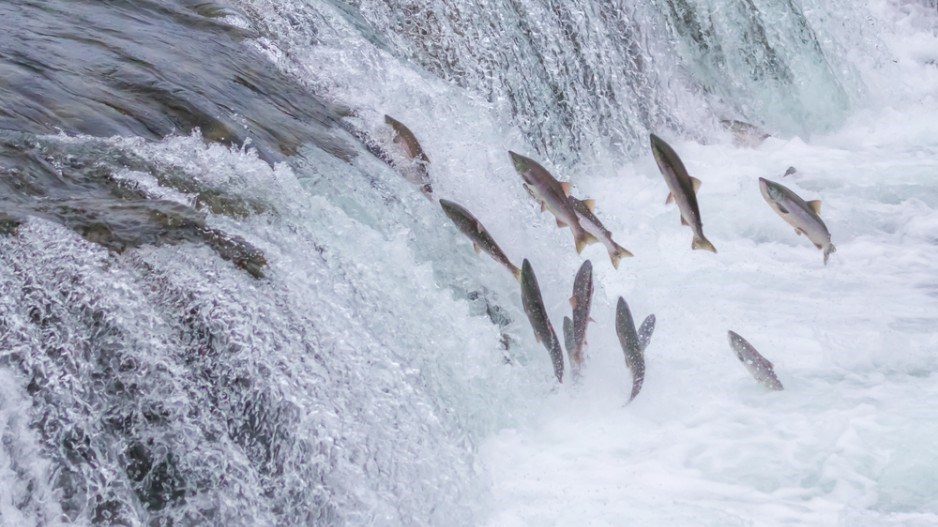This election marks a watershed moment for protecting wild Pacific salmon.
Three political parties have pledged to transition open-net pen fish farms of Atlantic salmon along our coast to closed (likely land-based) systems. Ecological responsibility is finally being prioritized over the practice of polluting the environment for free.
The science is increasingly clear: fish farms are harmful to wild salmon and present unacceptable risks to a keystone species and everyone and everything that rely on it. The essence of the problem is that when the two populations (farmed Atlantic and wild Pacific) occupy the same seawater but are separated only by a net, parasites and viruses pass freely from farmed to wild salmon, and vice versa.
The waste from the farms creates dead zones on the ocean floor; sea lice which breed in unnaturally large numbers on the farms attach to out-migrating wild smolts and literally eat them alive, leaving them easy targets for predators; and net pen farms incubate and amplify viruses such as Piscine Orthoreovirus, which causes jaundice in wild Pacific salmon, notably including our endangered chinook.
Ecologists have been sounding the alarm for decades, and in 2012, the federally appointed Cohen Commission found that “the potential harm posed to Fraser River sockeye salmon from salmon farms is serious or irreversible.”
Justice Cohen further stated that the precautionary principle (enacted in the 1990s after we obliterated the cod in Atlantic Canada) requires removal of open-net pen salmon farms from the B.C. coast unless new evidence can be provided to prove “no harm.”
Because B.C. has more at risk than Atlantic Canada and all other salmon farming jurisdictions (we have millions of Atlantic salmon in open pens on wild Pacific salmon migration routes) our provincial government has said it will not renew or issue new farm tenures after 2021 unless the fish farmers can prove “no harm” – something we don’t think they can honestly do.
Predictably, the fish farmers prefer the status quo (it’s cheaper “polluting for free”) and so they call the new policy direction “alarming,” “reckless” and “impossible.” The usual arguments follow: “inconclusive science” (recall tobacco industry tactics years ago); “sustainable aquaculture isn’t technically feasible or commercially viable” (like Detroit criticizing electric cars a few years ago) – and on and on.
But global venture capital has already committed to this clean, green, sustainable form of aquaculture, which keeps wild, and farmed fish separate. Currently there are 58 commercial-scale projects in 20 countries in various stages of construction worldwide. B.C. has many natural advantages, but we if we dither for much longer we risk being left behind.
No one is advocating an end to aquaculture in B.C. but rather an end to old technology that pollutes our ocean for free. The annual gross revenue to B.C. from all of the 115-plus fish farm tenures is less than $2 million, which works out to less than the price of a one-bedroom apartment in Victoria per farm. And the employment provided by net pen farming in B.C. is substantially less than the employment provided by the wild salmon economy, which includes sports fishing, commercial fishing, processing and tourism – all of which depend on the survival of wild salmon.
Most importantly, wild salmon have sustained our coastal and Interior First Nations for millennia. They are culturally and ecologically irreplaceable. Try pricing that into your risk analysis.
All industries have to evolve. Let’s embrace and expand truly sustainable aquaculture in B.C. We know from polling that the vast majority of British Columbians support a responsible transition now. Let’s retrain employees and put incentives in place to site sustainable farms in the same communities that currently supply most workers. The sun is rising on an industry that’s higher-tech, higher-value, preserves and upgrades jobs and protects a threatened iconic species.
It’s time to put wild Pacific salmon first and thank those principled enough to do so.
Signatories:
Tony Allard, Chairman, Wild Salmon Forever, Chairman, Hearthstone Investments; Michael Audain, O.B.C. O.C. Chairman, Audain Foundation; Ross Beaty, O.C. Chairman, Pan American Silver Corp, President, Sitka Foundation; Stuart Belkin, Chairman & CEO Belkorp Industries Inc.; Karen Flavelle, CEO, Purdys Chocolatier; Robert Foord, President, Sembord Investments; Rick Hansen O.B.C, O.C., Founder of Rick Hansen Foundation; Carol Anne Hilton, MBA CEO and Founder of The Indigenomics Institute; Dave Lede, Chairman and CEO Ledcor; Carol Anne Lee, entrepreneur; Peter Leitch, President, North Shore Studios & Mammoth Studios, Chair, Motion Picture Production Industry Association of B.C.; Brandt C. Louie, O.B.C. Chair and CEO H.Y. Louie Co. Limited & London Drugs Limited; Stuart McLaughlin, CEO Higher Ground Holdings, Chair, Grizzly Bear Foundation; Tracey McVicar, Partner, CAI Capital Partners/ Vancouver; Willie Mitchell, President | Partner Tofino Resort + Marina; Ryan Peterson, CEO and Co-Founder of Finger Food Advanced Technology Group; Cathy Roozen O.C., A.O.E. Chairman/Secretary, Cathton Investments Ltd; Holly Vear, Lawyer, Woodward & Co.; Roy Henry Vickers, O.C. O.B.C. Artist; Tamara Vrooman, President and CEO Vancity Credit Union; Mandy Wesley, Haida Guide.




